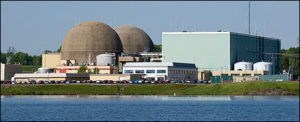 Dominion Energy Virginia has informed the Nuclear Regulatory Commission (NRC) of its intention to file for licenses to operate two nuclear units at its North Anna Power Station in Louisa County for another 20 years.
Dominion Energy Virginia has informed the Nuclear Regulatory Commission (NRC) of its intention to file for licenses to operate two nuclear units at its North Anna Power Station in Louisa County for another 20 years.
North Anna One began commercial service in 1978, North Anna Two in 1980. Originally licensed to operate for 40 years, both had their licenses renewed for an additional 20 years. The pair provides 1,892 net megawatts of electricity, enough electricity to power 473,000 homes. As base-load plants, they operate around the clock, except when they are taken off-line for periodic maintenance.
“Renewing North Anna Power Station’s licenses for a second 20-year period is the right thing to do for our customers, the regional economy and the environment,” said Daniel G. Stoddard, chief nuclear officer for Dominion’s nuclear generation division. “The planned relicensing of North Anna and Surry ensures that the benefits of these clean energy sources will continue to provide affordable, reliable, carbon-free electricity to our customers through the middle of the century. Our nuclear power stations have proven to be among the most-efficient and most-reliable sources of electricity in our fleet.”
North Anna directly support more than 2,000 high-paying jobs in Virginia and pays millions of dollars yearly in state and local taxes, Stoddard said. Continued operation of the units will help Dominion meet state goals for lowering carbon dioxide emissions from its fleet of power plants.
Despite nuclear’s zero-carbon attribute, many environmental groups oppose the technology on the grounds that the disposal of nuclear fuel creates its own set of environmental hazards. If the company were thwarted in its effort to re-license the nukes, it would have to acquire base-load capacity from another source. Coal, which emits more CO2 than any other power source, is out. Natural gas is much cleaner than coal, but still emits CO2, and environmentalists say that it is no better than coal once the full “life cycle,” including gas drilling and collector pipelines, is taken into account. The problem is that the environmentalists’ preferred power sources, wind and solar, are intermittent, which means they often do not produce electricity when it is needed. Battery storage is seen as solution to the intermittentcy issue, but batteries add a big new layer of cost.
Dominion argues that re-licensing its existing nuclear units, which have operated efficiently for five to six decades, (a) is not coal and does not emit CO2, (b) provides a stable source of electricity, and (c) keeps economic activity, jobs, and taxes in Virginia.
The company, which says that it foresees “no significant barriers” to renewal of the North Anna nuclear units, estimates that re-licensing and refurbishing the North Anna and Surry power stations will cost a total of $4 billion. That is roughly comparable to the cost of building four state-of-the-art gas-fired power units that provide roughly the same amount of electricity. The difference is that the cost of nuclear fuel is cheaper and less volatile than the cost of natural gas.


